Class 10 English Chapter 1.5 Question Answer Maharashtra Board
Balbharti Maharashtra State Board Class 10 English Solutions My English Coursebook Chapter 1.5 His First Flight Notes, Textbook Exercise Important Questions and Answers.
His First Flight Poem 10th Std Question Answer
My English Coursebook Standard Ten Guide Chapter 1.5 His First Flight Textbook Questions and Answers
Warming up!
Chit-chat:
1. Form Groups of 5. Remember your past days and share with your friends about memories of your first day at school or your first attempt at cooking. What role did your parents, siblings play to help you to overcome your fear?
1. Discuss and answer.
Question 1.
Discuss and answer.
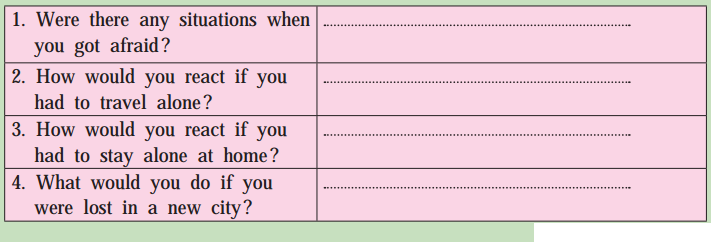
Answer:
| 1. Are there any situations when you get afraid? | – I Yes, I am afraid of sleeping in the dark at night, cold weather, street dogs, ghost stories and quarrels. |
| 2. How would you react if you had to travel alone? | – I would be greatly disturbed and depressed if I had to travel alone. It annoys me and I feel uncomfortable. |
| 3. How would you react if you have to stay alone at home? | – It would be afraid of staying alone at home and become uneasy and endlessly think that something untoward will happen when I am alone at home. |
| 4. What would you do if you were lost in a new city? | would cause confusion in my mind. I would lose my nerve and run helter- skelter to find any lead to my home or I shall collect myself and reach the police to get help from them. |

2. Complete the following table.
Question 1.
Complete the following table.
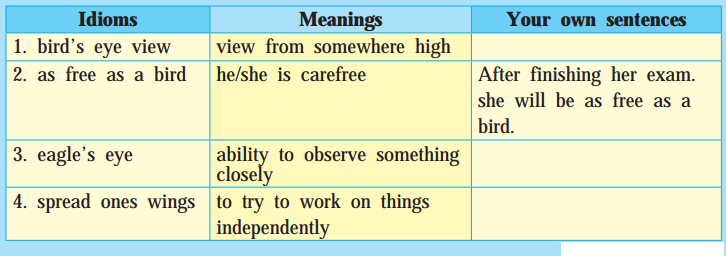
Answer:
| Idioms | Meanings | Your own sentences |
| 1. bird’s-eye view | view from somewhere high | We enjoyed the bird’s-eye view from the top of the mountain. |
| 2. as free as a bird | If he/she is care-free | After finishing her exam, she will be as free as a bird. |
| 3. eagle’s eye | His ability to observe something closely | The detective was watching every move of the thief with his eagle eyes. |
| 4. spread one’s wings | to try to work on things independently | After getting his training in papermaking, Kumar spread his wings to start his own paper mill. |

Find more such idioms using the following keywords.
Question 1.
Find more such idioms using the following keywords.

Answer:
- Fly – with flying colours, fly high, fly the nest, fly the coop, fly at somebody, fly into rage/temper, get off to flying start.
- Animals – the lion’s share, let sleeping dog lie, a dog in the manger, a snake in the grass, rain cats and dogs, to lead a cat and dog life, let the cat out of the bag, to smell a rat.
-
Colours – loose colours, with flying colours on black and white, catch red-handed, to become red and blue, a bolt from blue, once in a blue moon, look at the black side of things, stick to one’s colour.
(Note: Students may collect more such idioms and their meanings from good dictionary.)

English Workshop:
1. State whether the following statements are true or false.
Question 1.
State whether the following statements are true or false.
(a) The young seagull was not confident about the ability of his wings.
(b) The young seagull’s parents guided and improved his siblings in the art of flying.
(c) When the young seagull pretended to be falling asleep, his parents noticed him.
(d) Flying across the young seagull, the mother dropped a piece of fish into his beak.
Answer:
(a) The young seagull was not confident about the ability of his wings. –
True
(b) The young seagull’s parents guided and improved his siblings in the art of flying. –
True
(c) When the young seagull pretended to be falling asleep, his parents took notice of him. –
False
(d) Flying across the young seagull, the mother dropped into his beak a piece of fish. –
False
2. Complete the following statements.
Question 1.
Complete the following statements.
(a) The seagull was afraid to fly because …………………………………………………………….
……………………………………………………………………………………………………………………………………..
(b) Young birds are afraid to make their first flight because …………………………..
………………………………………………………………………………………………………………………………………
(c) Human beings find it difficult to face great challenges because ……………….
………………………………………………………………………………………………………………………………………
Answer:
(a) the seagull is afraid to fly because
he thought that his small, short wings would never support him to fly and he would fall and drown in the sea.
(b) Young birds are afraid to make their first flight because
they are not confident at their first flight
.
(c) Human beings find it difficult to face great challenges because
I think, human being also finds it a challenge to take its first steps. It is their natural instinct. When they try to stand and then to take further steps, they are afraid of falling and getting injured, so they are cautious and alert but do not give up.

3. Read the following words carefully and make meaningful sentences of your own, and write in your notebook.
Question 1.
Read the following words carefully and make meaningful sentences of your own, and write in your notebook.

4. Read the following words carefully and fill in the blanks by choosing appropriate word given in brackets.
Question 1.
Read the following words carefully and fill in the blanks by choosing appropriate word given in brackets.
(afraid, plunged, appeared, shrilly, skimmed, devoured, cowardice)
(a) Arun is full of ……….. .
(b) The violin played very ……….. .
(c) Ravi said, “Are you really ……….. of the dark?”
(d) The whole village ……….. into darkness.
(e) The lions ……….. their prey, hungrily.
(f) He ……….. through the report.
(g) One by one, the stars ……….. in the sky.
Answer:
(a) Arun is full of
cowardice
.
(b) The violin played very
shrilly and merrily
.
(c) Ravi said, “Are you really
afraid
of the dark?”
(d) The whole village
plunged
into darkness.
(e) The lions
devoured
their prey, hungrily.
(f) He
skimmed
through the report.
(g) One by one, the stars
appeared
in the sky.

5. Read about the space mission of Sunita Williams. Imagine you are going to interview her. Frame 10 to 12 interview relevant questions regarding –
- her early life, training
- education
- her actual flight into space
- future plans
- her message to viewers.
Question 1.
Read about the space mission of Sunita Williams. Imagine you are going to interview her. Frame 10 to 12 interview relevant questions regarding –
Answer:
Interview Questions to Sunita Williams :
Hello Madam! Congratulations on your great achievements in the Space Mission! May I ask you a few questions about your career and mission?
-
- Could you please tell me about your birthplace, family and early education?
- What motivated you to do M.Sc. in engineering Management? Where did you do it?
- What was your experience as a Naval Aviator in 1989?
- When and where did you begin your Astronaut Candidate Training?
- When were you selected by NASA for Astronaut Program?
- Will you please tell me about your experience at NASA?
- How did you feel when you were aboard the space shuttle Discovery to join the Expedition 14?
- How many days did you stay in the space during the Expedition 14?
- You have eclipsed the record in space by a woman. What was that record?
- What can you tell me about your second Expedition 32/33. What was your part in it?
- You took to the ISS a copy of Bhagavat Gita and a figurine of the God Ganesh and samosas. What was the thought behind it?
- How did the Government of India honour you? Why?
- What is your message to the young Indian generation?

6. Describe in your notebook the challenges you faced while learning to ride a bicycle, swimming or any skilL Take hints from the web to complete your write-up.
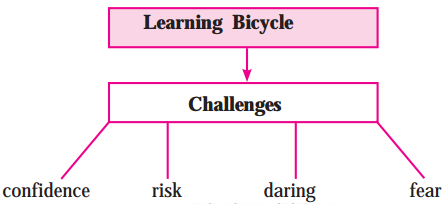
Question 1.
Describe in your notebook the challenges you faced while learning to ride a bicycle, swimming or any skilL Take hints from the web to complete your write-up.
Answer:
Riding a Bicycle:
Though some people think that riding a bicycle is a very simple easy thing, but it is not true. It is a challenging job. When you begin to learn cycle you must have to drive away and win over the fear of falling. While riding a cycle you are bound to fall once or twice or more and may get injured. So you must be bold and forget your fear of falling.
Secondly as a beginner don’t fully depend on a trainer or a supporter, otherwise you will never learn cycling. You should ride on your own with determination. You must be steady, stable and patient. You will have to look straight ahead of you and not to the handle or pedal or anywhere else. Sit properly on the seat and hold the handle firmly. Balancing is the next task/challenge. Be alert and ride the cycle carefully.
Pay attention to the vehicles coming in your way and you should be able to avoid them or there will be a possibility of an accident. Your concentration must be only on riding. Remember the traffic rules and follow them. After practising a lot you will be able to ride a bicycle confidently.

7. Project :
Question a.
Collect the career options related to flying. Find out the institutes where training of your options is given.
Find out the detailed information about the fees, duration of training and future prospects of it.
Answer:
(Students should collect the information asked for and present them in their class.)
Question b.
Collect or draw different pictures of birds from your surroundings and write about them. Make a chart with some information about each.
Answer:
(Make a chart with some information about the birds.)

Language Study:
1.
There are words that have the same pronunciation but differ in spellings. They are called Homophones. For example, (a) fair – fare (b) know – no Sometimes the words have the same spellings and pronunciation but can have different meanings in different situations.
They are called Homographs.
For example:
(a) watch – observe watch – portable timepiece
(b) fair – not very good, not very bad
fair – an exhibition and sale of items
fair – of complexion, skin tone
Note: Homophones and Homographs are together known as Homonyms.
Give the Homophones of the following.
(a) blue …. (b) bear …… (c) beet……… (d) to……… (e) son …………
Question 1
Give the Homophones of the following.
Answer:
(a) blue – blew
(b) bear – bare
(c) beet – beat
(d) to – two
(e) son – sun

2. Find from the lesson the Homophones of the following.
Question a.
Pick the Homophones from the text.
- see –
- wood –
- there –
- scene –
- won –
- eye –
- peace –
- threw –
- hence –
- knot –
Answer:
- see – sea
- wood – would
- there – their
- scene – seen
- won – one
- I – eye
- peace – piece
- threw – through
- hence – hens
- knot – not

Question b.
Explain how the underlined Homographs differ in meaning.
1. (a) He
saw
his two brothers. ……………………….
(b) The woodcutter cut the weakened branch with his sharp saw ……………………….
2. (a) The bird injured his
wings
. ………………………..
(b) He lives in the ‘c’ wing of the building. ……………………….
3. (a) The aeroplane will land at 9.00 pm. sharp. ……………………….
(b) He owns 10 acres of land ………………………..
4. (a) The head of the institution was on leave. ……………………….
(b) He bent his head down with chin. ………………………….
Answer:
1. (a) He
saw
his two brothers.
(b) The woodcutter cut the weakened branch with his sharp saw.
Answer:
In the sentence:
(a) the Homograph ‘saw’ is the past tense of the word ‘see’.
In the sentence:
(b) the Homograph ‘saw’ means a tool of a carpenter used for cutting wood.
2. (a) The bird injured his wing.
(b) He lives in the ‘C’ wing of the building.
Answer:
In the sentence:
(a) the Homograph ‘wing’ means the part of the body of a bird used for flying.
In the sentence:
(b) the Homograph ‘wing’ is one of the parts of a large building.
3. (a) The aeroplane will land at 9.00 pm. sharp.
(b) He owns 10 acres of land.
Answer:
In the sentence
(a) the Homograph ‘land’ means to come down through the air onto the ground.
In the sentence
(b) land means an area of ground used for some purpose.
4. (a) The head of the institution was on leave.
(b) He bend his head down with respect.
Answer:
In sentence
(a) head means the person in charge of an institution/organization.
In sentence
(b) head means the part of the body on top of the neck.
3. Read the following sentences carefully, underline the verbs and find out the tenses in the sentences.
Question 1.
(a) The sun was now ascending the sky.
(b) Still they took no notice of him.
(c) She is standing on a little high hump on the plateau.
(d) He leaned out eagerly.
(e) He just felt dizzy.
Answer:
(a) The sun was now ascending the sky. –
Past Continuous Tense
(b) Still they took no notice of him. –
Simple Past Tense
(c) She is standing on a little high hump on the plateau. –
Present Continuous Tense
(d) He leaned out eagerly. –
Simple Past Tense
(e) He just felt dizzy. –
Simple Past Tense

Live English :
Form Filling:
Form filling is a skill. It is a functional skill and a life skill. Today, a big amount of data is collected offline and online through forms. From a tedious task to an interesting task, the online tools have made form filling a unique experience. We will see how offline and online forms are filled and what steps are followed and what care is taken while filling the forms.
Preparing for the form filling process:
- Gather all the essential information. (personal, professional, educational etc.)
- Verify names, addresses, references, contact details to be entered.
- Know the information not to be provided.
- Get a template and create a model form.
Question 1.
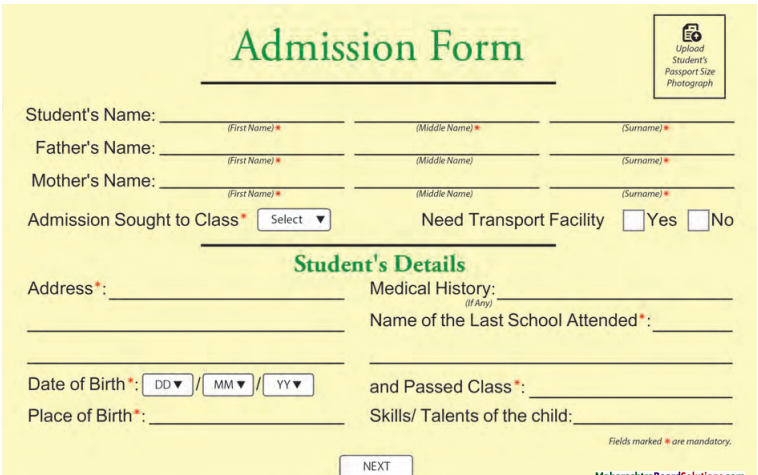
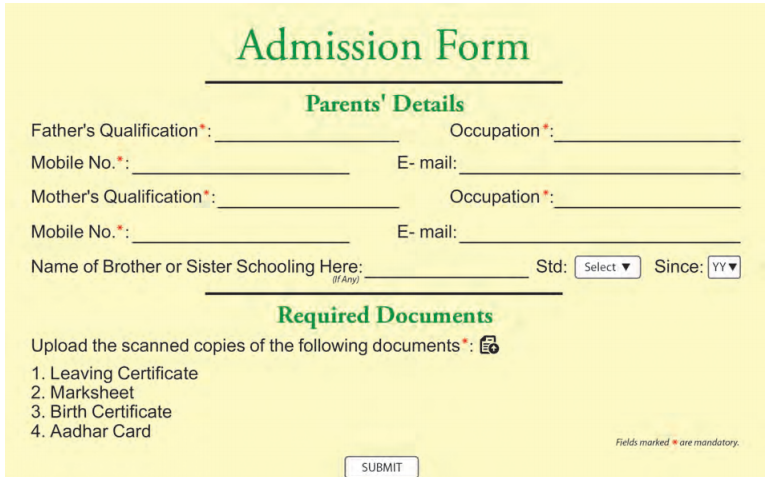
Answer:
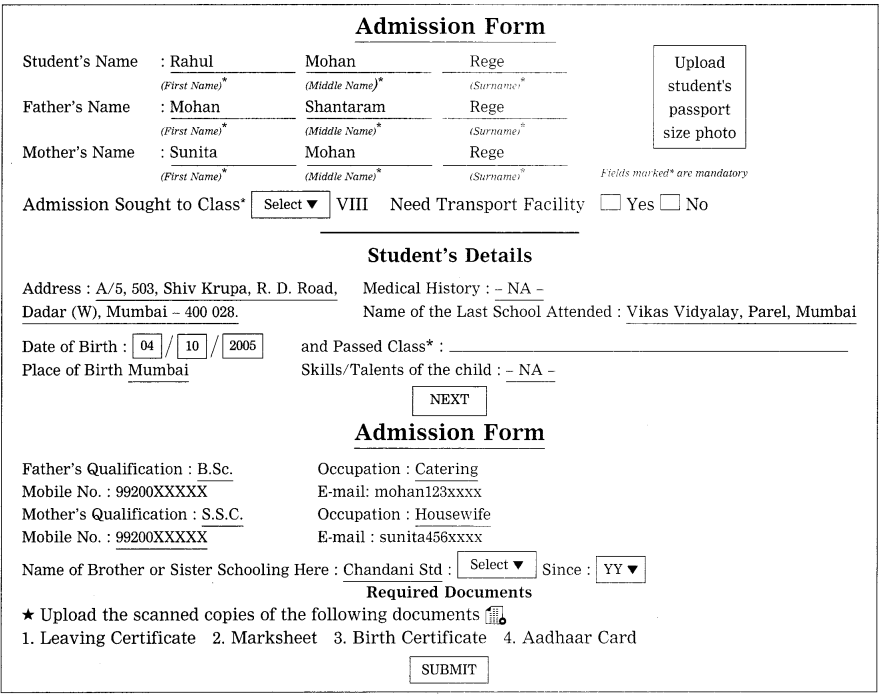
My English Coursebook 10th Digest Chapter 1.5 His First Flight Additional Important Questions and Answers
Read the following passage and do the activities :
Simple Factual Activity :
Question 1.
State whether the following statements are True or False :
Answer:
- The wings of the young seagull were not as short as his own. – False
- The whole family of seagulls commended him for his cowardice. – False
- The young seagull was fed a piece of fish by his mother. – False
- The young seagull’s father was preening the feathers on his white back. – True

Question 2.
Complete the following sentences using information in the passage:
(Answers are directly given and underlined.)
Answer:
- The young seagull commended himself to dive and soar and curve .
- He completely forgot that he had not always been able to fly .
- He flapped his wings once and he soared upwards .
- He turned his beak sideways and cawed amusedly .
Complex Factual Activities :
Question 1.
How did the seagull parents perfect the young seagull’s brothers and sister in the art Of flight?
Answer:
The parents of the seagull flew about with his brothers and sister, perfecting them in the art of flying. They trained them how to skim the waves and how to dive for fish. When they succeeded in the art, the parents circled about them raising a proud cackle to encourage them.
Question 2.
Complete the web describing the young seagull’s feelings while trying to fly:
(Answers are directly given.)
Answer:
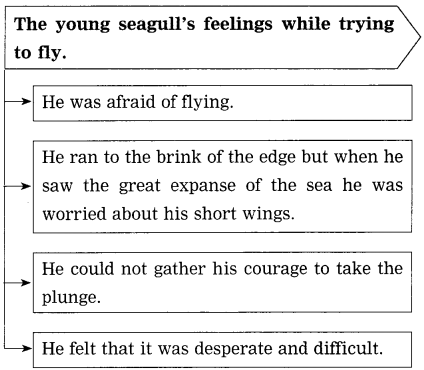

Question 3.
What were the young seagull’s parents doing?
Answer:
The young seagull’s father was cleaning his white back feathers smooth with his beak. His mother was looking at the young seagull. She stood on a little high hump on the plateau. Her white breast was thrust forward. Now and again, she tore at a piece of fish that lay at her feet and then scrapped each side of her beak on the rock. She was trying to attract the young one’s attention towards the piece of fish.
Question 4.
Complete the web :
(Answers are directly given and underlined.)
Answer:
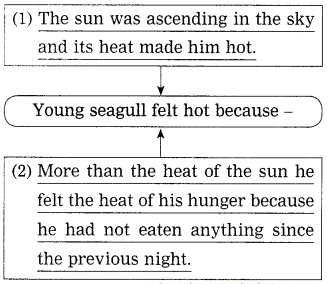
Question 5.
How did the young seagull learn his first flight?
Answer:
When the young seagull was calling his mother plaintively, his mother had picked up a piece of fish and was flying across to him with it. He leaned out eagerly trying to get nearer to her as she flew across. But when the piece of fish in her beak was almost within his reach, his mother halted, her wings motionless. Maddened by hunger, the young one dived at the fish.
While doing so he fell outwards and downwards into space. He was frightened but the next moment he felt his wings spread outwards. The wind rushed against his breast, then under his stomach and against his wings. His wings cut through the air. He was not falling headlong now. He was soaring gradually downwards and outwards. This is how he learnt his first lesson of flight.

Question 6.
Complete the web :
(The answers are directly given and underlined.)
Answer:
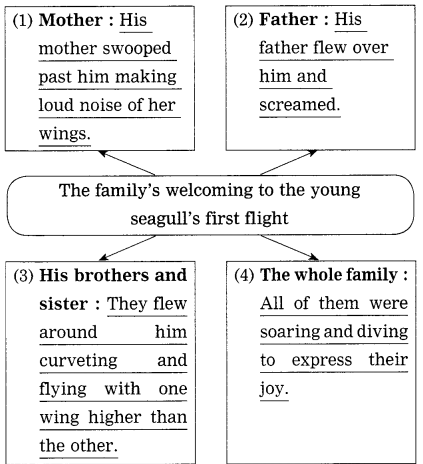
Question 7.
What did the young seagull forget? What did he do then?
Answer:
The young seagull completely forgot that he had not always been able to fly. He commended himself for his diving and soaring and curveting shrieking shrilly.

Question 8.
When did the young seagull get his prized scraps of dog-fish?
Answer:
The young seagull was completely exhausted after his first flight. He drooped his legs to stand on the green sea. His legs sank in it. He screamed with fright and tried to rise again flapping his wings. But he was tired and weak with hunger and he could not rise. His feet sank into the green sea and then his belly touched it and he could sink no farther. He was floating on it. His family admired his feat (achievement) and offered him scraps of dog-fish which he deserved.
Activities based on Vocabulary:
Question 1.
Guess the meanings of:
Answer:
- muster up courage – to gather courage
- cliff – a high steep face of a rock
- upbraiding – scolding
- brink – the edge of a steep place
Question 2.
Match the words in Column ‘A’ with their meanings in Column ‘B’ :
| ‘A’ | ‘B’ |
| 1. ascending | (a) grabbed |
| 2. maddened | (b) flying upward into the air |
| 3. soaring | (c) made one very angry |
| 4. seized | (d) rising up |
Answer:
| ‘A’ | ‘B’ |
| 1. ascending | (d) rising up |
| 2. maddened | (c) made one very angry |
| 3. soaring | (b) flying upward into the air |
| 4. seized | (a) grabbed |

Question 3.
Find the present participles from the passage :
Answer:
ascending, standing, falling, lying, dozing, preening, looking, scrapping, begging, calling, flying, tapping, trying, wondering, cutting, soaring.
Question 4.
Match adjectives given in Column ‘A’ with the nouns given in Column ‘B’ :
| ‘A’ | ‘B’ |
| 1. high | (a) scream |
| 2. joyful | (b) nightfall |
| 3. monstrous | (c) hump |
| 4. previous | (d) terror |
Answer:
| ‘A’ | ‘B’ |
| 1. high | (c) hump |
| 2. joyful | (a) scream |
| 3. monstrous | (d) terror |
| 4. previous | (b) nightfall |
Question 5.
Read the following words carefully and make meaningful sentences of your own by using them :
- plaintively
- monstrous
- whet
- soar.
Answer:
- The young widow plaintively mourned when she saw her husband’s dead body in a coffin covered by tricolour.
- A monstrous wave swallowed the boat with some fishermen in it.
- He whetted his knife to cut the unwanted plants in the garden.
- The rocket soared up into the air.

Question 6.
Read the following words and fill in the blanks by using appropriate words given in the brackets :
(Answers are directly given and underlined.)
(commended, attempted, exhausted, soared)
Answer:
- The rocket soared up into space.
- Our achievements in Science Exhibition was highly commended by our Principal.
- He was totally exhausted after the day’s tedious work.
- The thief attempted to give the slip, but was caught by the police.
Question 7.
Match the words in Column ‘A’ with their meanings in Column ‘B’ :
| Column ‘A’ | Column ‘B’ |
| 1. ridge | (a) wear out |
| 2. exhaust | (b) small and thin pieces |
| 3. shriek | (c) a chain of hills |
| 4. scraps | (d) make a loud cry |
Answer:
| Column ‘A’ | Column ‘B’ |
| 1. ridge | (c) a chain of hills |
| 2. exhaust | (a) wear out |
| 3. shriek | (d) make a loud cry |
| 4. scraps | (b) small and thin pieces |

Question 8.
Read the following words and make meaningful sentences of your own by using them :
- beckon
- curveting
- exhausted
- amusedly
Answer:
- They were all beckoning him to join their team, but he did not respond.
- The eagle was curveting to land onto the ground to catch his prey.
- The old man was completely exhausted after the day’s long work.
- The children played in the rain merrily and amusedly .
Activity-based on Contextual Grammar :
Question 1.
Read the following sentences carefully, underline the verbs and then find out the tenses in the sentences : (Verbs are directly underlined.)
Answer:
- His two brothers and his sister had already flown away. – Past Perfect Tense
- But for the life of him he could not move. – simple Past Tense
- He became afraid. – simple Past Tense
- Since then nobody had come near him. – Past Perfect Tense

Question 2.
Identify the tense and then change it to Present Perfect Continuous tense:
The sun is ascending the sky.
Answer:
The sun has been ascending the sky.
Personal Response:
Question 1.
Are you afraid of playing any outdoor game? Explain why?
Answer:
Yes, I am afraid of playing Kabbadi. It appears to me that it is a very rough and tough game. I am very much afraid of the injuries caused in it. I cannot endure the thought of injury. I believe that it is a game for only strong and hefty people.
Question 2.
You are a teacher directing a play for your school/Annual Gathering. A boy is not acting according to your instructions. How will you make him act well?
Answer:
At first I shall tell the boy about the scene and the emotions in dialogues by giving him demonstration. If he goes wrong, I myself will show him how to do the piece. If he repeatedly makes mistakes, I will scold him and even threaten him of the consequences. But anyhow finally I will make him act well, acting the scene myself repeatedly.

Question 3.
How does your family help you to achieve your goal?
Answer:
My family is always there to help me in my work. Each one of them, especially my parents, help me in deciding my goal. If I neglect any day, they remind me of my goal all the while. They all are ready to guide me, in their own way, to achieve whatever I desire. They always encourage, admire and praise me even for my smallest achievement.
Activity-based on Contextual Grammar:
Do as directed:
Question 1.
He was near the sea now. (Frame a Wh-question to get the underlined as an answer.)
Answer:
Where was he now?
Question 2.
He could not rise. (Add a question tag.)
Answer:
He could not rise, could he?

Question 3.
But he was tired and weak with hunger.
(Use ‘not only – but also’.)
Answer:
But he was not only tired but also weak with hunger.
Activities based on Language Study
Do as directed :
Question 1.
Complete the words by using correct
- s t _ n d
- y o _ n g
- c l _ f f
- d i z _ y
Answer:
- s t a n d
- y o u n g
- c 1 i f f
- d i z z y
Question 2.
Put the following words in alphabetical order :
- motionless, scrapped, leaned, opposite
- feathers, felt, flapped, father
Answer:
- leaned, motionless, opposite, scrapped.
- father, feathers, felt, flapped

Question 3.
Punctuate the following sentences :
- ga ga ga he cried begging her to bring him some food
- the young seagulls father was curveting banking and soaring
Answer:
- “Ga, ga, ga”, he cried begging her, to bring him some food.
- The young seagull’s father was curveting, banking and soaring.
Question 4.
Make four words each (minimum 3 letters each) using the letters in the given word
brother
:
Answer:
both, bother, rot, other
Question 5.
Write related words as shown in the example :
(Answer is directly given and underlined.)
Answer:
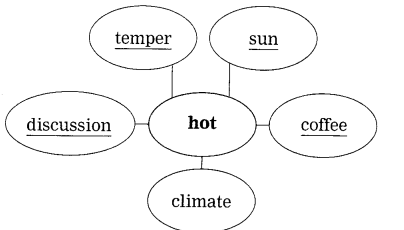
Question 6.
Complete the following word chain of nouns. Add four words each beginning with the last letter of the previous word :
ledge → ……………… → ……………… → ……………… → ………………
Answer:
ledge → egg → goal → land → doll
Do as directed :
1. Attempt anyone :
a. Make a meaningful sentence using the given phrase:
to muster up courage
Answer:
The young man could not muster up courage to pick up the mysterious box on the road.
OR
b. Add a clause to the following sentence to expand it meaningfully :
The bird dared not fly
Answer:
The bird dared not fly because he was afraid of falling in the sea.

2. Attempt anyone :
a. Add a prefix or suffix to make new words :
1. manage
2. arrange
Answer:
1. management
2. rearrange
OR
b. Make a meaningful sentence using any one of the following words :
1. manage
2. arrange
Answer:
1. He could manage to collect enough money to pay his school fees.
2. She arranged the flowers in a vase.